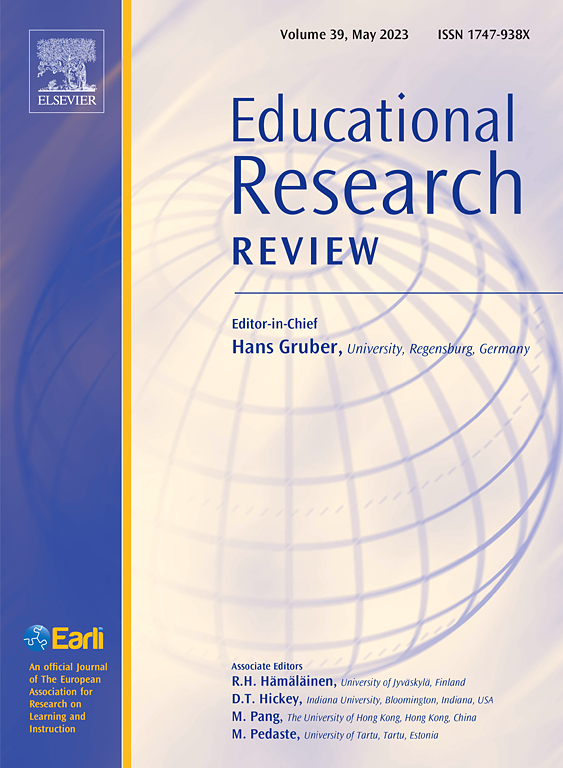Meta-analysis of associations between digital parenting and children's digital wellbeing
IF 10.6
1区 教育学
Q1 EDUCATION & EDUCATIONAL RESEARCH
引用次数: 0
Abstract
The present study is contextualized in the rapidly digitalizing world where many parents struggle to maximize their children's online learning opportunities and protect the latter against online risks. It employed three-level meta-analysis to synthesize findings from 88 primary studies (2008–2024) on associations between digital parenting (positive mediation, negative mediation, co-use, general digital parenting) and children's digital wellbeing (positive, negative, digital use). The study is original in the comprehensive examination of associations between the different types of digital parenting and children's digital wellbeing. There are three sets of results. First, digital parenting was negatively associated with children's negative digital wellbeing. The magnitude of association between digital parenting and children's negative digital wellbeing was the largest for co-use, followed by positive and negative mediation. Second, digital parenting was not associated overall with children's positive digital wellbeing or digital use. However, the association between digital parenting and children's positive digital wellbeing was stronger for positive mediation than negative mediation or co-use. Types of digital parenting did not moderate the association between digital parenting and children's digital use. Third, there were some significant moderator effects for children's sex, geographical regions, data sources for digital parenting and children's digital wellbeing, and cross-sectional/longitudinal research designs. The study advances theory by providing evidence that there is no one-size-fits-all approach to digital parenting for comprehensively enhancing children's digital wellbeing. It also emphasizes the need for researchers to differentiate among different types of children's digital wellbeing that are influenced by digital parenting.
数字育儿与儿童数字健康之间关系的荟萃分析
本研究的背景是在快速数字化的世界中,许多父母努力最大限度地提高孩子的在线学习机会,并保护后者免受在线风险。该研究采用了三层荟萃分析,综合了88项主要研究(2008-2024年)关于数字育儿(积极调解、消极调解、共同使用、一般数字育儿)与儿童数字健康(积极、消极、数字使用)之间关系的研究结果。这项研究是对不同类型的数字育儿与儿童数字健康之间关系的综合研究的原创。有三组结果。首先,数字育儿与孩子的负面数字幸福感呈负相关。在共同使用的情况下,数字育儿与儿童消极数字幸福感之间的关联程度最大,其次是积极和消极的中介。其次,数字育儿与孩子积极的数字健康或数字使用总体上没有联系。然而,在积极的中介作用下,数字育儿与儿童积极的数字幸福感之间的联系要强于消极的中介作用或共同使用。数字父母的类型并没有调节数字父母和孩子的数字使用之间的联系。第三,儿童性别、地理区域、数字育儿与儿童数字幸福的数据来源以及横断面/纵向研究设计存在显著的调节效应。该研究通过提供证据来推进理论,证明没有一种放之四海而皆准的方法来全面提高儿童的数字健康。它还强调,研究人员有必要区分受数字化育儿影响的不同类型的儿童数字健康。
本文章由计算机程序翻译,如有差异,请以英文原文为准。
求助全文
约1分钟内获得全文
求助全文
来源期刊

Educational Research Review
EDUCATION & EDUCATIONAL RESEARCH-
CiteScore
19.40
自引率
0.90%
发文量
53
审稿时长
57 days
期刊介绍:
Educational Research Review is an international journal catering to researchers and diverse agencies keen on reviewing studies and theoretical papers in education at any level. The journal welcomes high-quality articles that address educational research problems through a review approach, encompassing thematic or methodological reviews and meta-analyses. With an inclusive scope, the journal does not limit itself to any specific age range and invites articles across various settings where learning and education take place, such as schools, corporate training, and both formal and informal educational environments.
 求助内容:
求助内容: 应助结果提醒方式:
应助结果提醒方式:


